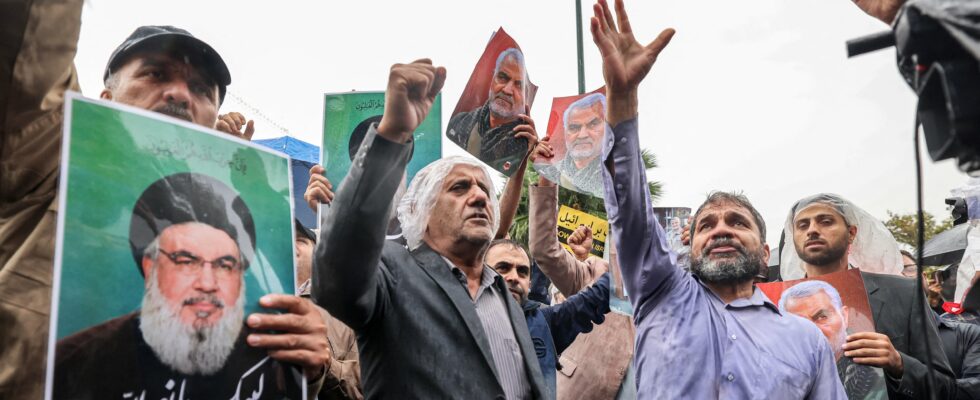“There is no place in the Middle East that Israel cannot reach.” Benjamin Netanyahu’s warning on September 30 is unambiguously addressed to Tehran. “The regime is plunging our region deeper into darkness and deeper into war,” insisted the Israeli Prime Minister.
If Israel wants to put an end to the existential threat weighing on its state, its answer lies in Tehran. Netanyahu knows this. Biden, the American president, knows this. Khamenei, Iran’s number one, knows this. Actually, everyone knows it. Mohammed bin Salman, the Saudi leader, was not mistaken. Before October 7, the prince wanted, in his modernizing impulse, to cut Khamenei’s quid, and ensure his regional domination by negotiating a fundamentally revolutionary peace with the Hebrew state.
Hamas felt it too. Before October 7, this peace threatened the entire balance of forces that served the organization. The agreement between Saudi Arabia and Israel would have paved the way for the settlement of the Palestinian question. It was inconceivable that the leader of the Muslim world, which houses the holiest places of Islam, would leave so many of his brothers in an untenable situation. And Israel perhaps more than ever would have given in. Because seeing an end to the Jewish state’s existential struggle, even for a cynical leader like Netanyahu, would have been a political victory of historic significance.
There is no peace possible with the mullahs’ regime
This peace was buried on October 7. When the dream breaks, we wake up in a nightmare. The nightmare where hope has given way to the extreme, and where only the law of retaliation exists.
Israel knows that if it finally wants to sleep peacefully, the biggest challenge facing it arose 45 years ago. The Islamic Republic of Iran was founded on the very idea of the destruction of Israel. Its “proxy”, Hezbollah, even more so. In essence, the Islamic revolution of 1979 is total, without nuance. “Khamenei has an ideology that has not blinked since he came to power following the death of Ayatollah Khomeini in 1989,” explained Stanford researcher Abbas Milani in an interview with L’Express. “He thinks that the Western world is in decline, and that today it is Islam’s turn to dominate the world.”
There is no peace possible with the mullahs’ regime. No pragmatism, no negotiation, no “realpolitik”. Realism, the rational approach, here is to understand that today’s Iranian leaders have only one objective: to gain time to establish their definitive position by means of an atomic weapon which would make them untouchable. Why we Europeans have been negotiating with them for twenty years on this nuclear program without obtaining much remains a mystery. For fear of chaos, for fear of the post-mullah, for fear of Libya, of Iraqi chaos, of Daesh. Yes, the Middle East is a complex space, which short-sighted Western policies have shaped into a quagmire that seems inextricable. But in all this complexity, some things are simple: in Tehran there persists a regime which supported Hamas and October 7, which created Hezbollah and therefore much of the instability in Lebanon, which assassinates its opponents and violates its women, who have led Westerners into false negotiations for two decades.
A breach in the Iranian defense system
By destabilizing Hezbollah, by decapitating its charismatic leader, Israel has put a first breach in the Iranian defense system. Hezbollah, for Tehran, means thousands of missiles permanently pointed at Israel. Life insurance for the Iranian regime, which guarantees that its nuclear installations will not be bombed. By breaking the head of the Shiite militia, Israel made the first gesture of a mikado which risks ending in a collapse of the entire protection system carefully put in place by the Iranians.
How far will Israel go? Will other members of the command of the Revolutionary Guards, the regime’s militia, be targeted, even though they have already been the target of Israeli attacks on several occasions? Two commanders were killed in Damascus last April and near Nasrallah, a deputy commander was killed. Nuclear sites? Official places near Isfahan, such as the Nuclear Technology Center, which had already been targeted last April, appear to be easy targets. There also remains the Iranian establishment, the new president, Massoud Pezeshkhian, but he does not have a central role in security issues. The brain? Supreme Guide Ali Khamenei, central figure of the Tehran regime.
An act that would unambiguously lead to war. Gage is to think that Israel will not go that far. Some commentators claim that Israel’s attacks will push the Islamic Republic to finish developing atomic weapons. This is looking at the problem backwards. The Iranians will continue their policy of regional destabilization, whatever Israel’s attitude.
